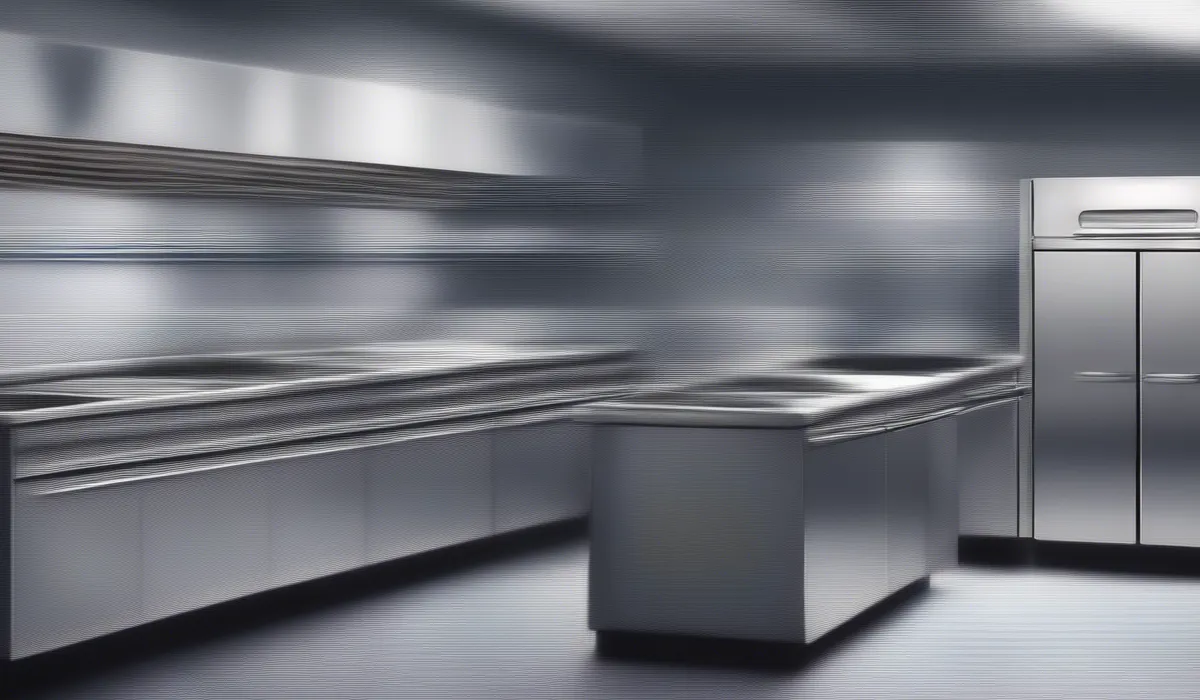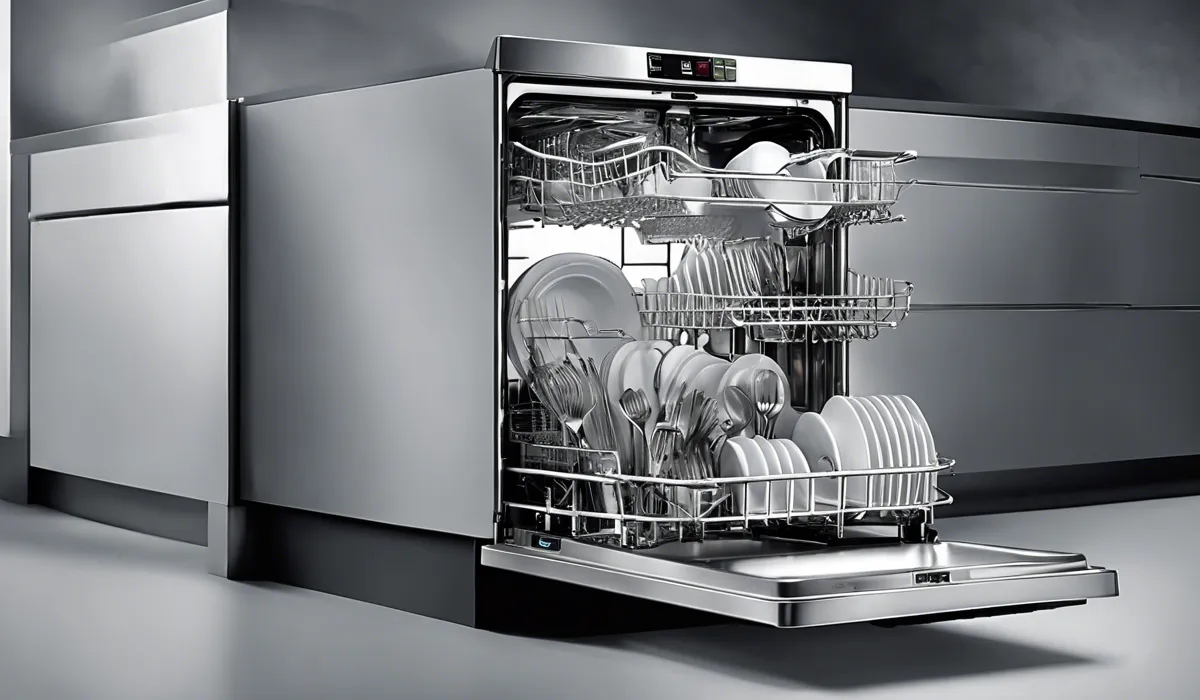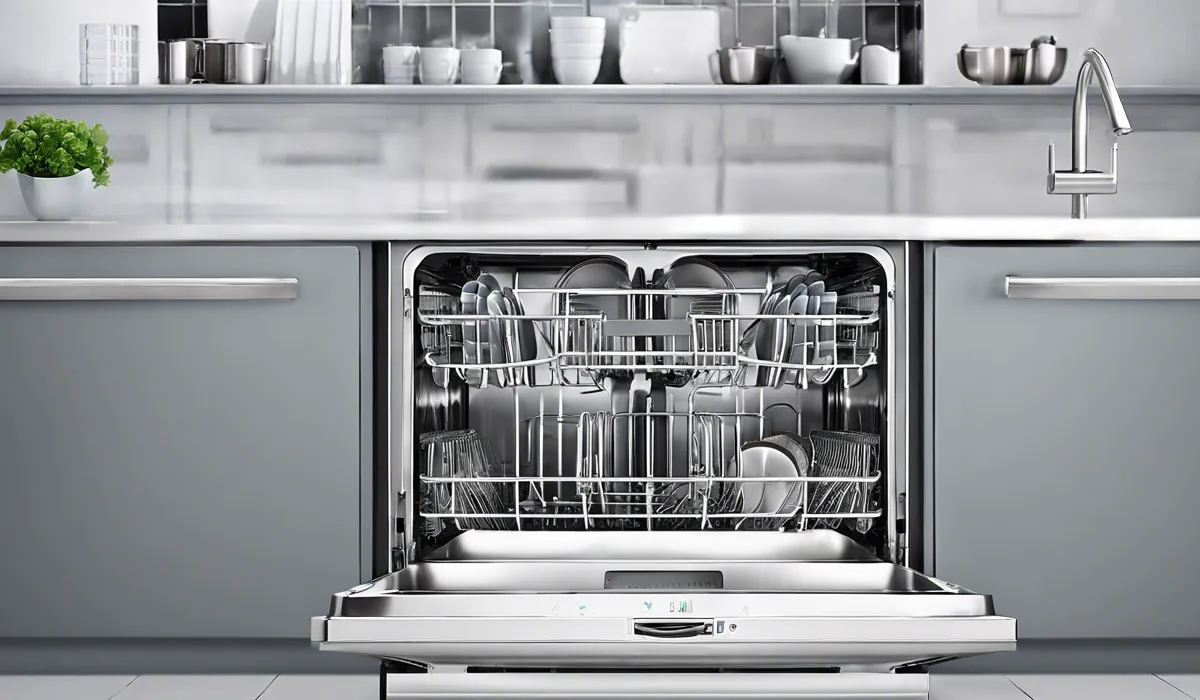What is a Commercial Dishwasher? Uncover Its Cleaning Power!
A commercial dishwasher is a heavy-duty appliance designed for frequent use in restaurants, hotels, and other food service settings. It efficiently cleans a large volume of dishes rapidly, using high-temperature water and powerful jets. These dishwashers vary in size and capacity to meet different business needs.
Understanding Commercial Dishwashers

Definition and Purpose
Commercial dishwashers are essential appliances in food service businesses, designed for high-volume, efficient cleaning of dishes, glasses, and utensils.
Unlike their residential counterparts, these powerhouses are built to withstand the rigors of continuous use, ensuring that kitchen operations run smoothly and hygienically.
Residential vs. Commercial
Commercial dishwashers differ from residential models in several ways. They have more robust construction, higher water temperatures, and faster wash cycles, enabling them to clean large stacks of dirty dishes quickly.
This ensures that restaurants can continue to serve meals on clean dishware without any delays.
Types of Commercial Dishwashers
Understanding the right type of commercial dishwasher for your business is crucial.
Options range from compact undercounter models to large conveyor systems designed for high-volume establishments. Each has its unique features and benefits that can cater to different operational needs.
Undercounter Dishwashers
Perfect for small cafes or bars, undercounter dishwashers fit neatly under a counter, providing excellent wash quality without taking up much space.
Conveyor Dishwashers
For kitchens with a high demand for clean dishes, conveyor dishwashers are ideal. They move racks of dishes through various wash and rinse zones, providing a continuous cleaning process.
Door Type / Rack Dishwashers
These dishwashers are a step up in capacity from undercounter models and are suited for medium-sized establishments. Racks of dishes are manually pushed into the machine where they are cleaned and then removed.
Glasswashers
Specifically designed for bars and restaurants that need to clean large quantities of glassware, glasswashers are gentle yet effective at removing lipstick, fingerprints, and other marks while preventing damage to delicate items.
Essential Features
When choosing a commercial dishwasher, several features must be considered to ensure it meets the demands of a busy kitchen.
High Temperature vs. Low Temperature Sanitizing Options
High-temperature dishwashers use heat to sanitize dishes, while low-temperature models rely on chemical sanitizers. Each has its own benefits and compliance considerations depending on the nature of the food service establishment.
Capacity and Size Variations
The size and capacity of a commercial dishwasher should align with the volume of dishes your business generates. From compact to expansive, there’s a size to fit every kitchen’s needs.
Speed and Cycle Times
Speed is paramount in a busy kitchen. Dishwashers with quick cycle times can turn around dirty dishes fast, keeping pace with the demands of peak service hours.
Key Components and Operation

Basic Components
Commercial dishwashers are equipped with several key components that work together to ensure a thorough clean.
Wash and Rinse Arms
These arms deliver powerful jets of water to remove food residue and sanitize dishes. They are a critical part of the machine’s effectiveness.
Pumps and Motors
The heart of the dishwasher, pumps and motors circulate water and drive the wash arms, providing the necessary force to clean dishes thoroughly.
Heating Elements
These elements heat water to the temperatures required for both washing and rinsing, which is essential for sanitation and drying.
Control Systems and User Interfaces
Modern dishwashers come with sophisticated controls that allow users to customize wash cycles, monitor performance, and troubleshoot issues.
Operational Cycle
The operation of a commercial dishwasher is a well-orchestrated cycle that ensures maximum efficiency and cleanliness.
Loading Procedure
Proper loading of dishes maximizes the machine’s efficiency and prevents damage to items during the wash cycle.
Wash Cycle
The wash cycle involves spraying dishes with a mixture of water and detergent at high pressure to remove food and grease.
Rinse Cycle
Following the wash, the rinse cycle uses fresh, often hot water to remove any remaining detergent and to sanitize the dishes.
Drying Mechanism
Some commercial dishwashers include a drying phase, using heat or fans to ensure that dishes come out dry and ready for immediate use.
Maintenance and Cleaning
Regular maintenance and cleaning are vital to the longevity and performance of commercial dishwashers.
Regular Cleaning Tasks
Daily cleaning tasks include wiping down the interior, removing and cleaning filters, and checking spray arms for clogs.
Water Quality and Treatment
Water quality can affect the cleaning effectiveness and machine longevity. Softening or treating water may be necessary to prevent scale and maintain performance.
Service and Repairs
Regular servicing and timely repairs can prevent downtime and extend the lifespan of the dishwasher, ensuring it continues to meet the needs of a busy kitchen.
Considerations for Choosing a Commercial Dishwasher

Assessing Business Needs and Volume
Choosing the right commercial dishwasher requires a thorough understanding of your business’s specific needs and the volume of dishes to be cleaned.
Estimating Daily Dish Load
Estimating the amount of dishes used daily will guide you in selecting a dishwasher with the appropriate capacity and speed.
Space Considerations and Layout
The layout of your kitchen and the space available will influence the type and size of the dishwasher you can accommodate.
Energy Efficiency and Sustainability
Energy-efficient and sustainable practices are not only good for the environment but can also lead to cost savings.
Water Usage
Choosing a dishwasher that uses water efficiently can significantly reduce utility bills and conserve resources.
Energy Consumption
Energy-efficient models can lower electricity bills while still providing the high temperatures needed for sanitation.
Detergents and Chemicals
Selecting the right detergents and sanitizers that are effective yet environmentally friendly is important for sustainable operations.
Cost Analysis
Weighing the initial investment against long-term savings is crucial when purchasing a commercial dishwasher.
Initial Investment vs. Long-term Savings
Higher-quality machines may have a higher upfront cost but can lead to greater savings in the long run through efficiency and durability.
Operating Costs
Consider the ongoing costs of water, energy, and detergent when choosing a dishwasher, as these will affect your bottom line.
Maintenance and Repair Costs
Regular maintenance and potential repairs should be factored into the total cost of ownership of a commercial dishwasher.
Compliance with Health and Safety Regulations
Ensuring your commercial dishwasher meets health and safety standards is not just a legal requirement but also a commitment to the well-being of your customers and staff.
Sanitization Standards
Adhering to sanitization standards is essential for passing health inspections and preventing foodborne illnesses.
Local Health Code Requirements
Local health codes may have specific requirements for dishwashing equipment, and it is important to ensure that your machine is compliant.
FAQs About Commercial Dishwashers
What exactly is a commercial dishwasher?
A commercial dishwasher is a robust, high-performance appliance specifically designed to wash a large number of dishes quickly and efficiently, using high-temperature water and strong water jets, for use in settings like restaurants and hotels.
How does a commercial dishwasher differ from a residential one?
Commercial dishwashers are built for higher volume and more frequent use, have faster wash cycles, larger capacities, and use hotter water compared to residential dishwashers.
What types of commercial dishwashers are available?
Commercial dishwashers come in various types, including undercounter, door type, conveyor, and flight type, each varying in size, capacity, and specific features to cater to different business requirements.
How quickly can a commercial dishwasher clean dishes?
Commercial dishwashers can typically complete a wash cycle in a few minutes, depending on the type and model, allowing for rapid cleaning of dishes during service.
Are commercial dishwashers energy efficient?
Many modern commercial dishwashers are designed to be energy efficient, using less water and energy per cycle while still maintaining high cleaning performance, though efficiency varies by model.
Final Thoughts
A commercial dishwasher is an essential appliance for high-volume dish cleaning in food service industries.
Designed to withstand frequent usage, it utilizes hot water and strong jets to quickly and efficiently clean a substantial quantity of dishes, with varying sizes and capacities to accommodate the demands of different businesses.





